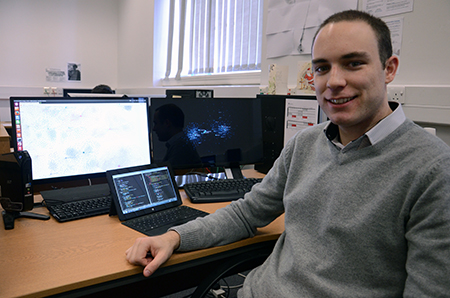
“Broadly, my PhD project concerns Algorithms for Distributed Computing. More specifically my research is concerned with Search, Discovery, Rendezvous, Gathering and Patrolling problems in both geometric and network based settings. The project aims to carry out research on the performance analysis of mobile agents or robots that find themselves in these scenarios.
“Due to the dynamic nature of our world, and beyond, it is important to model and find decentralised solutions to a variety of situations. Such models include varying not only the environment but also the capabilities of the agents, for example allowing for different maximum speeds, limited memory, the ability to leave markers or messages, as well as variations to communication limitations or methods.
Robot swarms
“To vary the environment we would diversify the topologies in network settings, as well as differences in the geometric domains used. We use both deterministic and randomised approaches to solve these types of problems.
“The movement to decentralised self-organisation of robots has already begun, with companies using robot swarms to manage warehouses and development of swarm robotics to aid with disaster relief and evacuation.
“As my PhD has progressed I have been devoting more of my time on new research areas in Social Network Analysis.
“One such area is bot detection in these networks. While analysing twitter networks we have noticed that, visually, it is easy to detect the pretence of bots. We believe that there should be an easy way to computationally locate these bot sub networks, and will be looking into this over the next year.
“I also work with a team based in the Department developing new methods of influence analysis and clustering methods within such networks. We have also developed software applications to aid this direction of our research.
Biological networks
“During the summer of 2013, I was involved in a joint six month project with the Institute of Integrative Biology at the university. This project was funded by an NERC grant for Efficient Biological Network Discovery and Analysis.
“The grant covered the analysis of functional genomics datasets of environmental influences. Through this grant I, together with my supervisors, were able to apply what we had learned from Social Network influence detection and clustering methods to biological networks as well.”
Find out more about studying at the University of Liverpool by visiting our Study pages.
You can follow the Department of Computer Science on twitter: @LivUni_CompSci